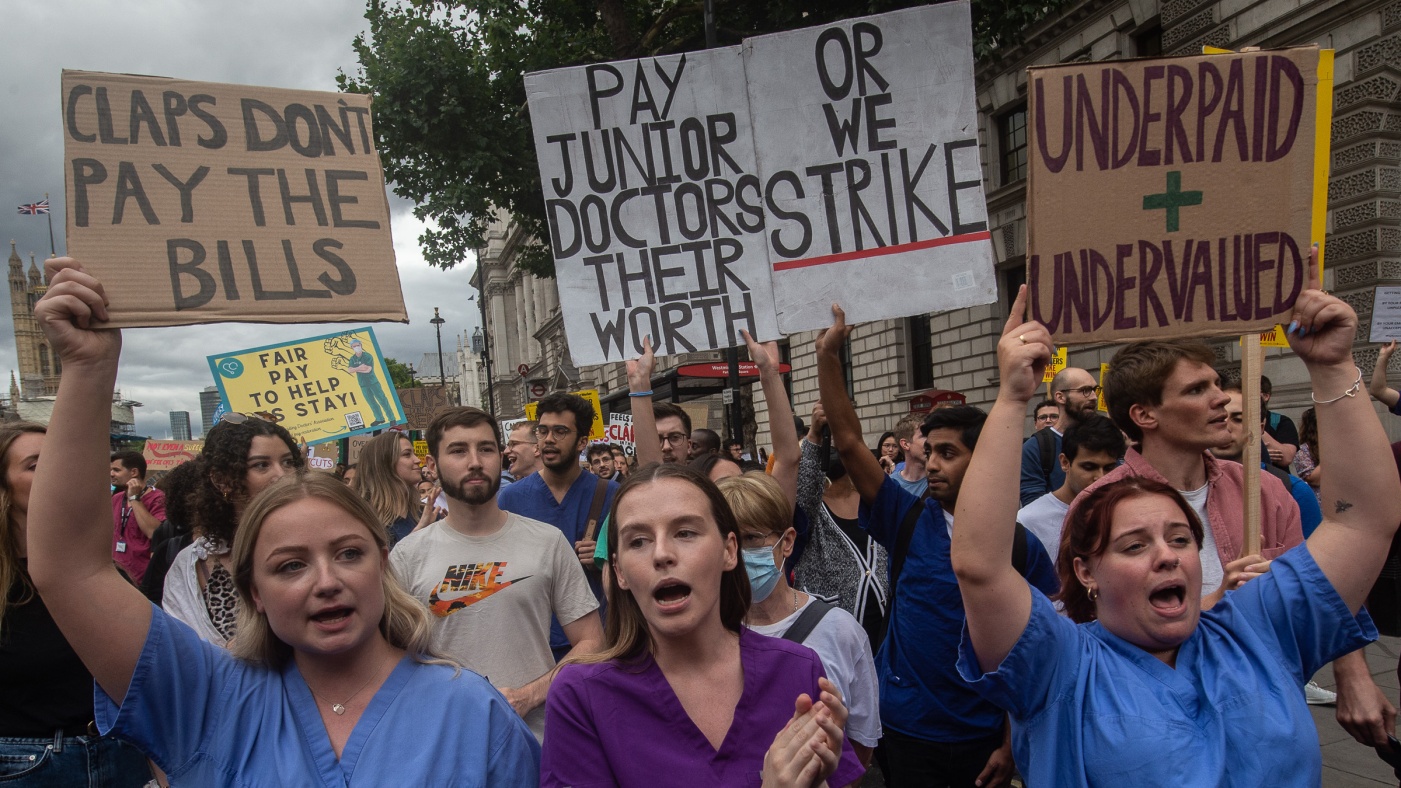Junior doctors’ strike: can bitter row be solved?
Longest period of NHS industrial action begins with doctors demanding a 35% pay rise

A free daily email with the biggest news stories of the day – and the best features from TheWeek.com
You are now subscribed
Your newsletter sign-up was successful
The NHS is seeing its longest-ever period of industrial action with tens of thousands of junior doctors joining picket lines across England.
Members of the British Medical Association (BMA) are striking for three days in the “most extensive disruption for the NHS and patients since a wave of industrial action by healthcare workers began in December”, said the Financial Times.
But unlike strike action taken by nurses and ambulance workers, junior doctors have not agreed similar arrangements to maintain emergency and critical cover during walk-outs, leaving hospital chiefs “rushing to maintain services”, said the paper.
The Week
Escape your echo chamber. Get the facts behind the news, plus analysis from multiple perspectives.

Sign up for The Week's Free Newsletters
From our morning news briefing to a weekly Good News Newsletter, get the best of The Week delivered directly to your inbox.
From our morning news briefing to a weekly Good News Newsletter, get the best of The Week delivered directly to your inbox.
The walk-out comes after a ballot of junior doctors by the BMA last month, in which more than three-quarters of members participated, and in which 98% voted to strike and call for a 35% pay increase.
‘Make more serving coffee than serving patients’
On Saturday the BMA “rejected an eleventh-hour offer” from health secretary Steve Barclay to join “formal pay talks on the same basis other health unions accepted”, including calling off this week’s strike, said the FT.
The BMA has argued that junior doctors’ real-terms pay has been cut by 26% since 2008 despite increasing pressure on the profession and soaring waiting lists. The union launched a campaign over the weekend that claimed baristas at Pret a Manger made more per hour than a junior doctor. It said that while the sandwich chain will pay “up to £14.10 per hour” to its staff, a junior doctor “makes just £14.09”.
“Thanks to this government you can make more serving coffee than saving patients,” said the campaign. “This week junior doctors will take strike action so they are paid what they are worth.”
A free daily email with the biggest news stories of the day – and the best features from TheWeek.com
Almost a third of junior NHS doctors now say they are tempted by a move to Australia, which offers “fewer hours” and “50 per cent more pay” as well as “great coffee, great beaches and great weather”, said Dr Matt Morgan in The Spectator.
The NHS is already facing a shortfall of some 12,000 hospital doctors and 50,000 nurses. But “the good news” is that “the haemorrhage of staff can be treated”, said Morgan, as “few people really want to leave their home, their country and their family”.
Yet doctors need to feel “valued and supported by the system. It is imperative that the UK retains its doctors,” added Morgan. “Any health service is, after all, completely and utterly reliant on them.”
‘35% pay increase has raised eyebrows’
But in response to the campaign, government aides have argued that “the average junior doctor earned £55,436 in 2021-22, when counting payments for night and weekend shifts”, reported Politico. Indeed, the argument being put forward by the BMA is “more complicated than the ones put forward by most other unions” and has “raised eyebrows”, said the BBC.
That’s because “no junior doctor has seen pay cut by 26%” since 2008. “There are five core pay points in the junior doctor contract with each a springboard to the next. It means they move up the pay scale over time until they finish their training,” explained the BBC. A junior doctor in 2008 “may well be a consultant now, perhaps earning four times in cash terms what they were then”.
In its editorial today, The Telegraph said: “People may sympathise with the medics, who have seen their real incomes fall in recent years, but they are not alone in that.
“Many whose treatments will be postponed are in the same predicament and are often paid far less than doctors,” added the paper. It argued that the pay rise being sought by the BMA is “ludicrously high at a time when most are having to accept less than the inflation rate”.
Sorcha Bradley is a writer at The Week and a regular on “The Week Unwrapped” podcast. She worked at The Week magazine for a year and a half before taking up her current role with the digital team, where she mostly covers UK current affairs and politics. Before joining The Week, Sorcha worked at slow-news start-up Tortoise Media. She has also written for Sky News, The Sunday Times, the London Evening Standard and Grazia magazine, among other publications. She has a master’s in newspaper journalism from City, University of London, where she specialised in political journalism.
-
 Colbert, CBS spar over FCC and Talarico interview
Colbert, CBS spar over FCC and Talarico interviewSpeed Read The late night host said CBS pulled his interview with Democratic Texas state representative James Talarico over new FCC rules about political interviews
-
 The Week contest: AI bellyaching
The Week contest: AI bellyachingPuzzles and Quizzes
-
 Political cartoons for February 18
Political cartoons for February 18Cartoons Wednesday’s political cartoons include the DOW, human replacement, and more
-
 Ukraine hints at end to 'hot war' with Russia in 2025
Ukraine hints at end to 'hot war' with Russia in 2025Talking Points Could the new year see an end to the worst European violence of the 21st Century?
-
 The future of X
The future of XTalking Point Trump's ascendancy is reviving the platform's coffers, whether or not a merger is on the cards
-
 The Democrats: time for wholesale reform?
The Democrats: time for wholesale reform?Talking Point In the 'wreckage' of the election, the party must decide how to rebuild
-
 What will Trump mean for the Middle East?
What will Trump mean for the Middle East?Talking Point President-elect's 'pro-Israel stance' could mask a more complex and unpredictable approach to the region
-
 Netanyahu's gambit: axing his own defence minster
Netanyahu's gambit: axing his own defence minsterTalking Point Sacking of Yoav Gallant demonstrated 'utter contempt' for Israeli public
-
 Should Sonia Sotomayor retire from the Supreme Court?
Should Sonia Sotomayor retire from the Supreme Court?Talking Points Democrats worry about repeating the history of Ruth Bader Ginsburg
-
 Meloni's migration solution: camps in Albania
Meloni's migration solution: camps in AlbaniaTalking Point The controversial approach is potentially 'game-changing'
-
 US election: why can't Kamala Harris close the deal?
US election: why can't Kamala Harris close the deal?Talking Point For the vice-president to win 'we need less mulling and more action in a do-or-die moment'